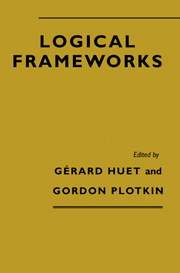Book contents
An algorithm for testing conversion in type theory
from Type Theory
Published online by Cambridge University Press: 04 August 2010
Summary
Introduction
The goal of this note is to present a “modular” proof, for various type systems with η-conversion, of the completeness and correctness of an algorithm for testing the conversion of two terms. The proof of completeness is an application of the notion of logical relations (see Statman 1983, that uses also this notion for a proof of Church-Rosser for simply typed λ-calculus).
An application of our result will be the equivalence between two formulations of Type Theory, the one where conversions are judgement, like in the present version of Martin-Löf set theory, and the one where conversion is defined at the level of raw terms, like in the standard version of LF (for a “conversion-as-judgement” presentation of LF, see Harper 1988). Even if we don't include η-conversion, the equivalence between the “conversion-as-judgement” and “conversion defined on raw terms” formulation appears to be a non-trivial property.
In order to simplify the presentation we will limit ourselves to type theory with only Π, and one universe. This calculus contains LF. After some motivations, we present the algorithm, the proof of its completeness and, as a corollary, its correctness. As a corollary of our argument, we prove normalisation, Church-Rosser, and the equivalence between the two possible formulations of Type Theory.
Informal motivation
The algorithm
The idea is to compute the weak head-normal form of the two terms (in an untyped way), and, in order to take care of η-conversion, in the case where one weak-head normal form is an abstraction (λx:A)M and the other is N a variable or an application, to compare recursively apply(N,ξ) and M[ξ].
- Type
- Chapter
- Information
- Logical Frameworks , pp. 255 - 279Publisher: Cambridge University PressPrint publication year: 1991
- 46
- Cited by



